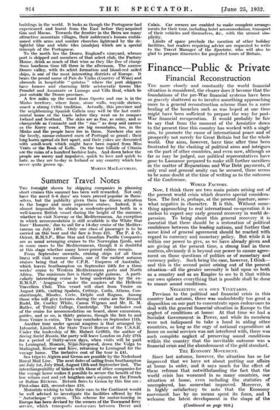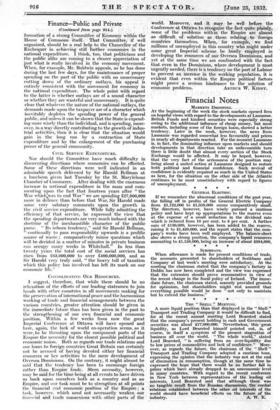Finance—Public & Private
Financial Reconstruction
THE more closely and constantly the world financial situation is considered, the clearer does it become that the foundations of the pre-War financial systems have been so gravely shattered as to involve something approaching more to a general reconstruction scheme than to a mere healing of the breaches such as was hoped at one time might have been sufficient to prepare the way for post-• War financial recuperation. It would probably he fair to say that from the moment of the Armistice down to the present time this country has worked with a single aim, to promote the cause of international peace and of prosperity not merely for Great Britain but for the whole world. Our aims, however, have time after time been frustrated by the clashing of political aims and intrigues on the part of other countries, and even now, although so far as may be judged, our political representatives have gone to Lausanne prepared to make still further sacrifices in the matter of Reparations and War Debt payments, if only real and general amity can be secured, there seems to be some doubt at the time of writing as to the outcome of the Conference.
WORLD FACTORS.
Now, I think there are two main points arising out of the present world crisis which deserve special considera- tion. The first is, perhaps, at the present juncture, some- what negative in character. It is this. Without some- thing approaching to real international co-operation it is useless to expect any early general recovery in world de- pression. To bring about this general recovery it is essential that there should be a restoration of political confidence between the- leading nations, and further that some kind of general agreement should be reached with regard to currency and monetary policy. But while it is within our power to give, as we have already given and are giving at the present time, a strong lead in these matters, obviously it is beyond our power to ensure agree- ment on those questions of polities or of monetary and currency policy. Such being the case, however, I think— and this Is the second point arising out of the present situation—all -the greater necessity is laid upon us both as a country and as an Empire to see to it that within our own spheres everything that is possible shall be done to ensure sound conditions.
NEGLECTING OUR OWN VINEYARDS.
Previous to the political and financial crisis in this country last autumn, there -was undoubtedly too great a disposition on our part to concentrate upon endeavours to deal with the general financial-situation in Europe to the neglect of conditions at homer At that time we had a Socialist Government in rower, and while its members were not indisposed to take a band in aiding other countries, so long as the orgy of national expenditure at home on social services was not interfered with, there was such complete neglect of preserving sound conditions within--the country that the inevitable outcome was a financial crisis and the abandonment of the gold standard.
TILE ECONOMY MOVEMENT.
Since last autumn, however, the situation has so far Unproved that we have set about putting our affairs at home in order, and it says much for the effect of these reforms that notwithstanding the fact that the World crisis has worsened in so many countries, our situation at home, even including the statistics of unemployed, has somewhat improved. Moreover, it is highly satisfactory to note that the Economy moVement. has by no means spent its force, and I welcome the latest development in the shape of the (Continued on page 910.) Finance—Public and Private
• (Continued from page 914), .
formation of a strong Committee of ECOnomy Within the House of Commons itself. That Committee, if well organized, should be a real help to the Chancellor of the Exchequer in achieving still further economies in the national expenditure. I think, too, that politicians and the public alike are coming to a clearer appreciation of just what is really involved in the economy movement. When, for example, Mr. Baldwin appeals, as he has done during the last few days, for the maintenance of proper spending on the part" of the public with no unnecessary cutting down of the ordinary outlays, his - appeal is entirely consistent with the movement for economy in the national expenditure. The whole point with regard to the latter is whether outlays are of a sound character or whether they are wasteful and unnecessary. It is quite clear that whatever the nature of the national outlays, the demands made upon the taxpayer are of a character which inevitably .depletes the spending power of the general public, and unless it can be shown that the State is expend- ing more wisely than the individual, and is spending, more- over, in a Way directlycontributingto the growth of indus- trial activities, then it is clear that the situation would gain in the long run by a contraction of State expenditure and by the enlargement of the purchasing power of the general community.
CIVIL SERVICE EXPENDITURE.
Nor should the Committee have much difficulty in discovering directions where economies- can be effected. Some of these directions were well indicated in an admirable speech delivered by Sir Harold Bellman at a luncheon given last Tuesday by the St. Marylebone Chamber of Commerce. After dealing with the enormous increase in national expenditure in the mass and com- menting upon the fact that fourteen years after "the War which;was to end War" We are spending 127,000,000 more in defence than before that War, Sir Harold made sonic very salutary comments upon the growth in the civil service expenditure. While fully admitting the efficiency of that service, he expressed the view that the spending departments are very much imbued with the doctrme of the inexhaustible character of the public purse. "Its inborn tendency," said Sir Harold Bellman, "continually to pass responsibility upwards is a prolific source of waste ; comparatively minor questions which will be decided in a matter of minutes in private business can occupy many weeks in Whitehall.' In less than twenty years the total cost of the social services has risen from £63,000,000 to over 1400,000,000, and as Sir Harold very truly said, " the heavy toll of taxation which this policy has involved has left its mark on our
economic life." • CONSOLIDATING OUR RESOTJRCES.
I suggest, therefore, that while there should be no relaxation of the efforts of our leading statesmen to join hands with other countries in all movements making for the preservation of international peace and-the harmonious -working of trade and financial arrangements between the various countries, greater attention should be given in the immediate future than has been given in the past to the strengthening of our own financial and economic position. Within a few weeks from now the great Imperial Conference at Ottawa will have opened and here, again, the lack of world co-operation seems, as it were, to be thrusting upon the component parts of the Empire the necessity for the closest possible political and economic union. Both as regards our trade relations and our loans to foreign countries Great Britain can certainly not be accused of having devoted either her financial resources or her activities to the mere development of Oversea Dominions. On the contrary, it might almost be said that the tendency has been to encourage foreign rather than Empire trade. Stern necessity, however, may be said for the time being at all events to have driven us back upon ourselves both as a country and as an Empire, and our task must be to strengthen at all points the financial and economic position- of the Empire ; a task, however, which need not necessarily weaken our linaheial and trade connexions with other parts of the world. Moreover, and it may be well before the Conference at Ottawa to recognize the fact quite plainly, some of the problems within the Empire are almost as difficult, of solution as those relating to foreign countries themselves. When, for example, we find millions of unemployed in this country who might under some great Imperial scheme be busily employed in developing the resources of our °verses Dominions, and yet at the same time we are confronted with the fact that even in the Dominions, where development is most urgently needed, there is a tendency on the part of Labour to prevent an increase in the working population, it is evident that even within the Empire political factors might prove a serious hindrance to the solution of



































 Previous page
Previous page